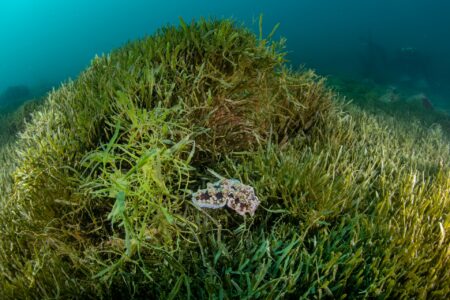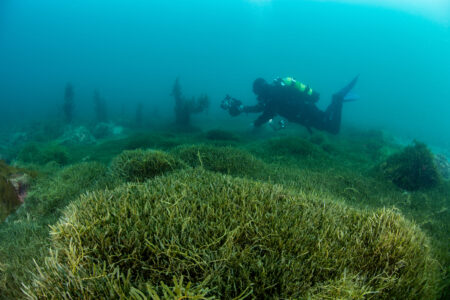
Two species of exotic caulerpa seaweed (Caulerpa brachypus and Caulerpa parvifolia) have been found in Auckland.
These exotic caulerpa can spread rapidly, forming vast, dense underwater fields and have the potential to seriously harm and transform our coastal environments.
They compete with other species, including our own native caulerpa species, for space and potentially upset the balance of local ecosystems, presenting a risk to recreational, cultural, and commercial marine activities.
Mayor Wayne Brown encourages all Aucklanders, boaties and beachgoers to follow this advice: know how to recognise caulerpa, know what to do if they think they’ve spotted the weed and know where to avoid going.
“Boatie to boatie, we need to do our bit to stop the spread of this pest. While we learn more about this seaweed, I ask the boating community to please be vigilant. Take every care not to spread it when you move your vessel,” says Brown.
“Please use moorings where you can instead of anchoring and please check that the area you are headed to doesn’t have a controlled area notice (CAN) or rāhui in place.
“If it does, it is unlikely that you will be able to anchor there, and some fishing restrictions may also apply. It pays to check the rules in place on the Biosecurity New Zealand website for the latest instructions.
“This incursion is a wake-up call to all boat owners to be extra careful about checking and cleaning anything that goes in the water, and making sure you’re not taking hitchhiking pests along with you as you move about.
“By being vigilant, we can slow down its spread while we learn more about how it behaves in New Zealand, and how we can potentially suppress it.”
The Ministry for Primary Industries is leading the response to exotic caulerpa, working closely with iwi, community groups and, in Tāmaki Makaurau, with Auckland Council’s marine biosecurity team.
“Auckland Council is focussed on driving education and awareness-raising efforts in the region to reduce the spread of exotic caulerpa and other marine pests,” says Liz Brooks, Auckland Council team manager, pathways.
“This includes deploying marine biosecurity champions, with financial support from Biosecurity New Zealand, at key locations to help educate as well as support beach and marine goers on what to look out for and follow the right advice.”

What should I do if I find exotic caulerpa?
When at sea, before moving to a new location, check your vessel’s anchor and anchor chain, as well as any other gear, like fishing lines or dive equipment, before moving to a new location.
If you bring up any seaweed (on your anchor or hook), bag it and bin it. That is, remove it and securely bag it or contain it and take it ashore for safe disposal on land, for example in a rubbish bin or compost.
If this can’t be done, people are asked to return it to the waters it came from. There will already be exotic caulerpa below and putting it back in this area will not pose a significant risk of spread.
If you are out walking on the beach, keep an eye out. If you think you’ve seen caulerpa washed up on the beach, pin, pic, and phone. That is – note the location, take a photo, and report on 0800 80 99 66 or at report.mpi.govt.nz.
Where should I avoid going?
As of November 2023, exotic caulerpa has been found in these Hauraki Gulf Marine Park locations:
Aotea Great Barrier Island: Cape Barrier to Port Fitzroy, including Whangaparapara, Tryphena and Okupu
Ahuahu Great Mercury Island: between Ahikopua Point and Maunganui Point
Kawau Island: Iris Shoal
Waiheke Island: Onetangi Bay and around Thompson’s Point
If you are boating, there may be anchoring and fishing restrictions that apply to these areas.
In the Auckland region, there is a Controlled Area Notice (CAN) in place at Aotea Great Barrier Island with updated controls at Aotea Great Barrier Island recently announced.
Mana whenua have also imposed rāhui in these same areas, in addition to the legal CANs in place at Aotea Great Barrier Island and Ahuahu Great Mercury Island.
And on Waiheke Island, Ngāti Paoa has imposed a rāhui on disturbing the seabed or anchoring within 1 nautical mile (1.8km) of Thompson’s Point or Onetangi Bay.
You can find the latest information on exotic caulerpa and the various legal rules in place.









